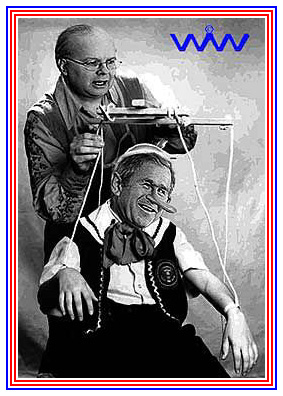
In his devastating new book, Ron Suskind shows how 9/11 allowed George W. Bush and his shadowy courtier, Dick Cheney, to "create whatever reality was convenient."
By Gary Kamiya
Jun. 23, 2006
If there are any observers who still deny that the Bush administration is the most secretive, vengeful, reality-averse, manipulative and arrogant government in U.S. history, they will have a lot of fast talking to do after reading Ron Suskind's new book, "The One Percent Doctrine." A meticulous work of reporting, based on interviews with nearly 100 well-placed sources, many of them members of the U.S. intelligence community, Suskind's book paints perhaps the most intimate and damning portrait yet of the Bush team.
But despite the Bush administration's apparent imperviousness to reality, the publication of "The One Percent Doctrine" is an important event. Even if we have to wait decades for historians to pass judgment on the Bush administration, it is vital that the record on which that judgment is made be compiled. And "The One Percent Doctrine," along with Richard Clarke's "Against All Enemies," George Packer's "The Assassins' Gate," Suskind's earlier "The Price of Loyalty" and a few others, will be one of the key documents on which that devastating judgment will be based.
Suskind opens the book with a damning scene in which a CIA analyst warns Bush in August 2001 that bin Laden was planning to strike the U.S. Bush's response: "All right. You've covered your ass, now." That dismissive reply displayed not just Bush's frat-boy boorishness but his poor judgment. And after the terrorist attacks came, all constraints on Bush -- and Cheney -- vanished.
Many reasons have been advanced for why Bush decided to attack Iraq, a third-rate Arab dictatorship that posed no threat to the United States. Some have argued that Bush and Cheney, old oilmen, wanted to get their hands on Iraq's oil. Others have posited that the neoconservative civilians in the Pentagon, Wolfowitz and Feith, and their offstage guru Richard Perle, were driven by their passionate attachment to Israel. Suskind does not address these arguments, and his own thesis does not rule them out as contributing causes. But he argues persuasively that the war, above all, was a "global experiment in behaviorism": If the U.S. simply hit misbehaving actors in the face again and again, they would eventually change their behavior.
"The primary impetus for invading Iraq, according to those attending NSC briefings on the Gulf in this period, was to create a demonstration model to guide the behavior of anyone with the temerity to acquire destructive weapons or, in any way, flout the authority of the United States."
One tale is particularly glaring. In January 2003, with the war propaganda machine in full gear, Tenet's chief of staff, John Moseman, saw the head of the CIA's Directorate of Intelligence, Jami Miscik, walking down the hall shaking with rage.
"You okay?" he asked. "No. I'm not okay. I'm definitely not okay!" In Tenet's suite, Miscik, barely able to get the words out, told what happened. "Stephen Hadley, Condi's second [now head of the NSC], had called from the office of 'Scooter' Libby, Cheney's chief of staff. They wanted her down at Libby's office in the White House by 5 pm. At issue was the last in an endless series of draft reports about the connection between Saddam Hussein and al Qaeda.
How many drafts? Miscik couldn't remember. The pressure from the White House -- and from the various intelligence divisions under the Vice President and the Secretary of Defense -- had started a week after 9/11. Miscik had repeatedly shot down the bogus connections advanced by the war hawks, in particular the specious claim that hijacker Mohammed Atta had met with an Iraqi agent in Prague. But Cheney and Rumsfeld and their parallel-intel shops -- factories cranking out war-justifying lies -- kept putting them back in. Miscik had sent her final draft to Libby and Hadley a few days before, and told them this was it -- she wasn't changing it again. Now they were after her again.
"'I'm not going back there, again, George,' Miscik said. 'If I have to go back to hear their crap and rewrite this goddamn report ... I'm resigning, right now.' She fought back tears of rage.
"Tenet picked up the phone to call Hadley. 'She is not coming over,' he shouted into the phone. 'We are not rewriting this fucking report one more time. It's fucking over. Do you hear me! And don't you ever fucking treat my people this way again. Ever!'
- more -

No comments:
Post a Comment